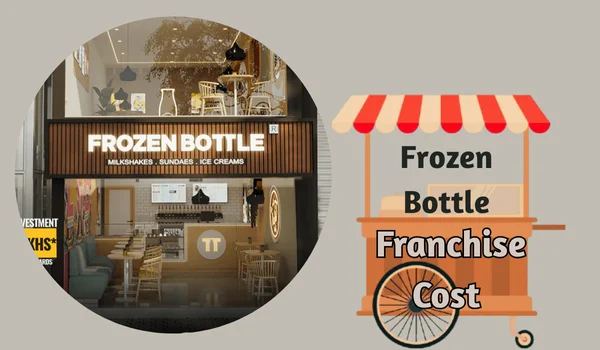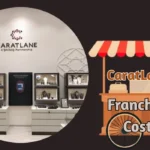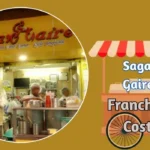If you’re exploring QSR/dessert cafés, Frozen Bottle is a popular, youth-centric Indian brand known for thick shakes, jars, sundaes, waffles and more. Before you commit, it’s crucial to understand the investment model, likely ROI, who qualifies, and the exact steps to apply. Below is an advisor-style, India-specific guide that consolidates what’s publicly available and flags where numbers vary so you can verify with the brand.
Snapshot: What Will It Cost?

Public figures for Frozen Bottle franchising vary across sources. Treat the ranges below as indicative until you receive a brand-issued quote.
- Total Initial Investment (setup + fee + basic opening stock):
Commonly reported ₹25–40+ lakh, with some portals quoting ₹20–25 lakh for smaller formats/cities and others stretching to ₹50–60 lakh depending on size and interiors. - Franchise Fee:
Most third-party sources place it around ₹5–8 lakh (sometimes up to ₹10 lakh). One Frozen Bottle blog post states ₹15–20 lakh as the “franchise fee,” which likely reflects a specific package or format—confirm directly with the franchisor. - Area Required:
~200–500 sq ft for a kiosk/compact café; IndiaFilings cites 250–500 sq ft with example budgets by size. - Royalty / Revenue Share:
Reports range from 6–8% royalty to ~5–10% brand share, while one portal claims zero royalty—this inconsistency makes it essential to get royalty, marketing levy, and payment frequency confirmed in writing.
Why the big spread? Costs swing with format (kiosk vs. café), location (mall vs. high street), city tier, interior spec, equipment (e.g., ‘stone’ add-ons) and whether corporate promos/waivers apply at that time. The brand’s official pages highlight multiple formats and city-specific outreach, which supports the idea that costs are tailored.
Business Model: How the Franchise Typically Works
- Format Options: Compact kiosks and small cafés (~200–500 sq ft). Lower capex kiosks can open the door to tier-II/III locations or mall corridors; larger cafés allow seating and wider menus.
- Omni-marketing + Menu Innovation: Dessert/QSR brands like Frozen Bottle rely on visual menus and social media-friendly products to drive walk-ins and UPTs (units per transaction). The company positions itself as “fast payback” and cites 200+ stores pan-India, indicating scale and playbooks for new cities.
- Brand Support: Official and partner pages mention site guidance, interiors as per brand design, training, launch marketing, and operations handholding. Confirm the precise scope (VM calendars, audits, supply chain SLAs, tech/POS, aggregator onboarding).
ROI: What to Expect (and What to Watch)
- Payback Period:
Many portals suggest ~12–24 months depending on rent, format, footfall and execution. Some optimistic claims cite 12–14 months in strong locations. Be conservative in projections. - Operating Levers:
- Rent-to-sales ratio: For compact dessert QSRs, target <12%.
- Power & Cold Chain: Budget for higher electricity and reliable backup—vital to keep frozen inventory consistent.
- Manpower: Small teams (3–6) with cross-training on prep + service.
- Local Marketing: Campus tie-ups, micro-influencer reels, Google Maps reviews, and aggregator visibility move the needle.
- Seasonality: Expect peaks around evenings/weekends/summers and dips during monsoon/winter in some cities.
- Reality Check: Some third-party analyses caution that profitability can be thin in low-visibility sites; location quality and disciplined opex control are crucial to hit double-digit net margins.
Eligibility Criteria (What the Brand Typically Looks For)
While Frozen Bottle doesn’t publish a rigid checklist, patterns across the ecosystem suggest:
- Promoter Profile: First-time entrepreneurs are welcome, but F&B/retail experience is a plus. Hands-on owners generally outperform absentee models. (Brand messaging emphasizes empowering new entrepreneurs.)
- Capital Adequacy: Ability to fund capex (₹25–40+ lakh typical) plus working capital for the first 3–6 months.
- Property: 200–500 sq ft, minimum frontage (often ~8–10 ft), and compliant power load. Malls, high streets near colleges, IT parks, and leisure clusters perform better.
- Compliance & Hygiene: FSSAI, GST, fire NOC, and brand SOPs on storage, temperature logs, and food safety.
Cost Breakdown (Indicative)
- Franchise Fee: typically ₹5–8 lakh (some sources: up to ₹10 lakh; brand blog says ₹15–20 lakh—verify).
- Kitchen Equipment: ~₹5.5–10 lakh depending on format.
- Interiors/Signage/Design: Highly variable; ballpark ₹10–20+ lakh, as per design scope and city.
- Initial Inventory & Launch Marketing: Brand/partner pages indicate bundled support—get an itemised pre-opening list and replenishment cadence.
- Royalty/Brand Share: 6–8% typical per portals; confirm if any national marketing levy applies.
Tip: Ask the franchisor for a city-wise capex benchmark (mall vs. high street), BOQ, and sample P&L at different average monthly sales (e.g., ₹8L/₹12L/₹15L).
Step-by-Step: How to Apply
- Register Interest on Official Pages
Use Frozen Bottle’s franchise pages (they also host “franchise opportunity by city”). Submit your city, property size/frontage, and contact details. - Discovery Call & Format Fit
Discuss store format (kiosk vs. café), target go-live, and support scope (training, launch plans, aggregator tie-ups, supply chain coverage). - Site Evaluation
Share exact address, carpet area, frontage, power load, rentals/CAM, and expected footfall. The team (or their channel partner) will approve or suggest alternates. - Commercials & LOI
Get a written breakdown: franchise fee, security deposit (if any), royalty/brand share, marketing levy, equipment list, interior specs/BOQ, project timeline, and contract term/renewal. Some partner listings show 5-year terms—confirm current policy. - Agreement, Fit-Out & Training
Sign FA/LOI, begin fit-out as per brand design, complete staff hiring & training, install POS, and schedule opening inventory. - Pre-Launch Marketing & Go-Live
Leverage brand assets, hyperlocal social + influencer reels, and aggregator promos. Track first 90-day KPIs: daily covers, ASP, UPT, rent-to-sales, food cost %, power cost %, and shrinkage.
Advisor’s Take: How to Improve Your Odds
- Triangulate the Numbers
Because franchise fee and royalty figures conflict across sources (some even claiming zero royalty), treat third-party portals as directional only and insist on an official, signed commercial sheet. - Stress-Test the P&L
Model scenarios at ₹8L / ₹12L / ₹15L monthly sales. Keep rent ≤10–12%, assume robust electricity bills, and build a buffer for monsoon/winter dips. - Location Over Low Rent
Dessert cafés are impulse + occasion businesses. A visible, youth-dense catchment (malls, colleges, multiplex clusters) generally outperforms a cheaper side street. - Operational Discipline
Cold chain uptime, recipe adherence, and fast service impact reviews and repeats. Track ratings on Maps/Zomato/Swiggy weekly.
Quick FAQ
1) What’s the realistic all-in cost?
Plan ₹25–40+ lakh for most small-format builds; very lean kiosks may dip closer to ₹20–25 lakh, while premium interiors can push ₹50–60 lakh. Validate with the brand for your city and site.
2) What royalty should I budget for?
Expect 6–8% (or equivalent brand share), but confirm whether any national marketing levy or minimum monthly royalty applies
3) How soon can I break even?
External blogs suggest 12–24 months; strong sites may do better, weak sites worse. Focus on rent discipline, power management, and hyperlocal marketing.
4) How do I start the application?
Submit an enquiry on the official franchise pages and request a format-wise cost sheet + sample P&L for your city.
Bottom Line
Frozen Bottle offers an accessible footprint and aspirational brand for dessert-QSR entrants. But the public cost data is inconsistent, so your first move is to secure the official quote and BOQ for your exact format and city.

Shashi Kant is the Founder and Editor of BusinessScroller.com, a leading platform for business insights, finance trends, and industry analysis. With a passion for journalism and expertise in business reporting, he curates well-researched content on market strategies, startups, and corporate success stories. His vision is to provide valuable information that empowers entrepreneurs and professionals. Under his leadership, BusinessScroller.com has grown into a trusted source for in-depth articles, customer care guides, and financial expertise.


